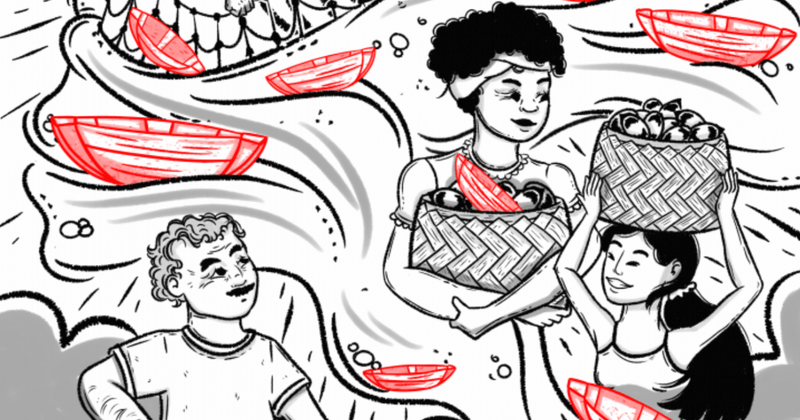Diane Pereira Sousa has a strong perspective on where philanthropy and development in Brazil need to go. We caught up with Diane and spoke about her work and her vision for a more inclusive sector.
What was the original inspiration for the Baixada Institute?
When I was 13, I worked at an NGO called Instituto Formação that ran programs in Baixada Maranhense, including my city, São Bento. Their vision was that in order to develop a community, you need more than a project, you need an integrated group of actions.
The program I worked on was focused on civic participation, and it involved everyone from teenagers to my parents and grandparents. It was all about getting out in the community – for instance, we learned about agriculture, not in a classroom but by working on a farm in someone’s backyard.
We knew that the Training Institute would only work in the area for 10 years. So the young people involved in the program decided to create the Baixada Institute, not as a standard NGO, but as a community foundation. It would be led by people from the Baixada, for people from the Baixada.
Our main goal at Baixada Institute is to find local talent and ideas, and finance them – so that people can develop their own solutions. We believe that is the best possible form of development we can have.
The philanthropy sector overall is going through a moment of reckoning – with more attention being paid to questions around power and privilege, for instance through the Shift the Power movement. What do philanthropy leaders in Brazil need to learn from these movements?
Philanthropy in Brazil has been receiving a lot of [attention] – people are poking at it and saying, “You need to do things a different way. This is not working for everybody.”
Part of the challenge is that philanthropy in Brazil was built in a very generic way. So it’s very difficult for people in philanthropy to see the roots of things; they only want to see the branches. Foundation leaders need to recognize that there are local solutions out there, and be willing to engage in conversation with people in different places to find solutions together.
Ultimately it is a question about power. Power is not a problem, per se. It’s not a problem that both foundations and communities have power to share. That’s why I don’t like to talk about the need for philanthropy to “step back”. It’s more about building a chair by their side. How can I sit by your side, so we can have a conversation about how I can bring my perspective and reality to get to the point that you, with the money, believe we need to get to?
I get frustrated when I hear donors say that communities need to be “empowered” – that they want to make a community stronger. That assumes that the people with power and money are strong, and the community is weak. That’s just not the case. We have our strengths; you have your strengths. And we need to look eye to eye to put those strengths together and build a relationship. Don’t tell us we have to be stronger – we are strong! And we can be stronger, we can do the things we want to do, with money.
What do you think is needed to build these equitable spaces?
What we really need is good relationships and honest conversations, and build a shared understanding around what development means in this region.
Recently a donor came to us and said they wanted to grant us 50,000 reais to build the infrastructure for community tourism in my town. They wanted to send young people in our community to school for four years, to take classes and become experts in geography so they could educate the tourists.
But these young people don’t need to study geography; they’ve lived in this town for 18 years, and they’ve spent 18 years learning its geography. These students came back from the university and told me, “This is not working! They’re teaching us the wrong things!”
What I would like is to have the opportunity to sit with that donor and talk about: how can we best use that 50,000 reais to achieve the goals you are hoping to achieve?
But we have a relationship problem. Yes, we have conversations. But there is a fear of really engaging honestly. The donor has the fear of being considered only a wallet. The community is afraid of being judged by their deficiencies. In order to have honest conversations, we need time to get to know each other, to develop a trusting relationship.
We have had some success at Baixada Institute at building these trusting relationships. We were founded in 2009, but it’s only been in the past three years that we’ve started engaging intentionally with donors. We felt it was time for us to share our perspective.
The first thing we did, in 2021, was to change an event that we had done for our grantees every year, to invite both grantees and donors.
The event is a dive into Baixada Maranhão for four days. But for donors, this is not a standard visit to check on impact metrics. We invite donors to come, and we are clear that we are not asking for money, we are inviting them to spend four days experiencing what it means to live here.
The donors pay for their ticket; we pay for the donors’ accommodations; and all of the communities we visit pay for food. So everybody has paid for something. Everybody enters a relationship of experiencing – experiencing the other, experiencing the unknown.
Everybody talks about community philanthropy – but to live it, that’s different.



.webp)

.webp)






.webp)
.webp)
.webp)














.webp)


